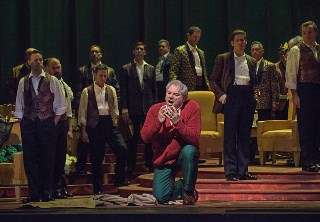|
Back
What Happens in Vegas Stays in Vegas New York
Metropolitan Opera
01/20/2017 - & January 26, 30, February 4, April 19, 22, 27*, 2017
Giuseppe Verdi: Rigoletto
Olga Peretyatko (Gilda), Nancy Fabiola Herrera*/Oksana Volkova (Maddelana), Joseph Calleja*/Stephen Costello (Duke of Mantua), Zeljko Lucic (Rigoletto), Stefan Kocán*/Andrea Mastroni (Sparafucile), Scott Scully (Borsa), Jeff Mattsey (Marullo), Clarissa Lyons (Countess Ceprano), Paul Corona (Count Ceprano), Nelson Martínez/Robert Pomakov* (Monterone), Maria Zifchak (Giovanna), Catherine MiEun Choi-Steckmeyer (A Page), Earle Patriarco (Guard)
Metropolitan Opera Chorus, Donald Palumbo(chorus master), Metropolitan Opera Orchestra, Pier Giorgio Morandi (conductor)
Michael Mayer (production), Christine Jones (set designer), Susan Hilferty (costume designer), Kevin Adams (lighting designer), Steven Hoggett (choreographer)

Z. Lucic (© Karen Arnold)
Michael Mayer’s Vegas production of Verdi’s middle-period masterpiece of foolish love and futile revenge is back for another revival. When this reimaging of Rigoletto premiered, it was both hailed and reviled for its provocative idiom. The Duke of Mantua’s court is transposed to Las Vegas in its early days, a glamorous but seedy haunt of pop culture stars of questionable morals in which a Frank Sinatra-like character presides over an entourage of lesser entertainers backed up by the mafia. The updated setting could still draw out the universal themes of misplaced love, bitter resentment, and blind revenge. Yet its garishness never quite allowed it to capture either the opera’s exploration of frailty and honor or its patina of true love and courtly refinement – attributes hardly imaginable in what Las Vegas represents in the popular imagination. Now, after several revivals, the concept seems a bit tired and even gimmicky. With one of the current administration’s disasters – the late Luc Bondy’s dreary production of Puccini’s Tosca – up for replacement next season, the time may have come for a new Rigoletto, too.
A practiced cast, however, can liven up even an exhausted staging, and Zeljko Lucic’s Rigoletto continues to set a fine standard of Verdi baritone singing. This time he even surpassed his earlier appearances with a much more nuanced study of the character’s vaulting emotional range. He seemed a little more risk-averse than in past runs, avoiding, for example, the high A flat that comes at the end of the vengeance duet that concludes Act II. But in the earlier monologue/aria “Cortigiani, vil’ razza dannata,” he floated superb pianos and captured the character’s desperation with engrossing drama. Olga Peretyatko returned as Rigoletto’s daughter Gilda and once again revealed an extraordinary talent. Floating crystalline highs and gorgeous appoggiatura, she is certainly the best exponent of the role singing today. As the Duke, Maltese tenor Joseph Calleja brought a warm, rich, and buoyant sound to this challenging role. He did not always take the chance with the high notes that have traditionally concluded some of the Duke’s music, and his use of vibrato is not always the most pleasing, but he stands out in today’s universe of tenors equipped for the part. Stefan Kocán’s stentorian Sparafucile remains an admirable fixture of the production. Mezzo Nancy Fabiola Herrera contributed an alluringly seductive Maddalena. Conductor Pier Giorgio Morandi, a former La Scala oboist in his debut season and production at the Met, led a well balanced performance with a superb understanding of the intricacies of the score.
Paul du Quenoy
|